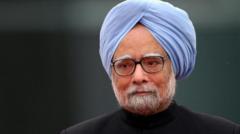**Former Prime Minister Manmohan Singh, who played a pivotal role in liberalizing India's economy, has passed away at the age of 92, leaving behind a complex legacy marked by both significant achievements and controversies.**
**Manmohan Singh: The Architect of India's Economic Reform Passes Away at 92**

**Manmohan Singh: The Architect of India's Economic Reform Passes Away at 92**
**Ex-Prime Minister Manmohan Singh's Legacy Lives On as Architect of India's Economic Transformation**
Former Indian Prime Minister Manmohan Singh, renowned for his instrumental role in transforming India's economy, has died at the age of 92 after a deterioration in health that necessitated hospitalization in Delhi. His tenure, which spanned from 2004 to 2014, saw him recognized as the architect of crucial economic reforms, following his impactful earlier service as finance minister during a critical phase in 1991.
Singh’s journey began in an impoverished village in Punjab, India; he completed higher education at prestigious institutions including the University of Cambridge and Oxford. His daughter, Daman Singh, reflected on his frugal student life, highlighting his resilience and humility in overcoming financial constraints during his studies.
Rising to prominence in 1991, Singh's first significant political role was as finance minister amid a looming bankruptcy. His groundbreaking reforms included slashing taxes, devaluing the currency, privatizing state enterprises, and effectively attracting foreign investment. These steps revitalized the economy, leading to sustained growth and inflation control in the 1990s.
Often described as the "accidental prime minister," Singh took office in 2004 under unusual circumstances; Congress party president Sonia Gandhi renounced the position, sparking allegations that she remained the true power behind the scenes. Despite a noteworthy achievement in enhancing India’s nuclear status through a pivotal deal with the U.S., he faced increasing criticism during his second term due to multiple corruption scandals that plagued his administration, contributing to the Congress party's electoral loss in 2014.
Singh’s diplomatic approach included continuing peace initiatives with Pakistan and negotiating economic cooperation with Afghanistan, embodying a pragmatic foreign policy. However, he often kept a low public profile, which some detractors interpreted as weakness, while others lauded his calm demeanor and integrity.
His post-premiership years saw him active within the Congress party, addressing pressing issues like the economic fallout from the COVID-19 pandemic. Singh remained open to scrutiny regarding the corruption allegations linked to his government, asserting his commitment to transparency.
Reflecting on his impact, Singh expressed hope that history would judge him favorably compared to contemporary critiques. He is survived by his wife and three daughters, and his contributions to India’s economic landscape are likely to echo through its continued evolution.



















